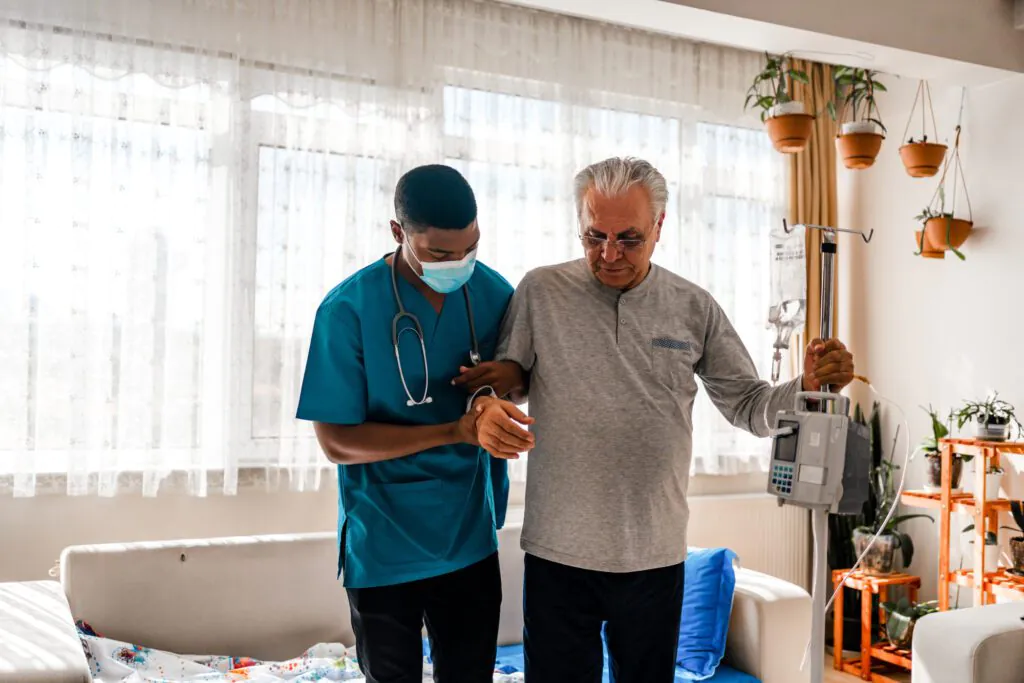
Situation
“Axios’ home care team has real commitment and empathy for patients,” said one woman who received remote healthcare services through the program. “They are understanding when I need to reschedule appointments and they’re even open to delivering care outside of business hours. Kudos to them.” – Patient enrolled in Axios-supported program
Where does a patient go when they’re in need of care and treatment? Many of us would immediately think of a hospital or some other medical facility, but that can be costly, involve a long wait, and put more of a burden on an already-overtaxed part of the healthcare system.
The COVID-19 pandemic only made this worse, with hospitals left with no choice but to reassign significant resources, time, and physical space to treat urgent coronavirus cases. This unfortunately, despite the best attempt by providers, left many patients in need of critical care and treatments for other diseases behind.
A new way was needed to provide post-acute and long-term care to complement care delivery in hospitals and health facilities.
Solution
Axios believes that effective treatment adherence programs are personalized to the needs of individual patients. To design a more effective solution to help patients stay on treatment, Axios turned to its proprietary Patient Needs Assessment Tool (PNAT).
PNAT assesses the risk factors that could lead the patient to stop treatment and helps determine the most effective adherence interventions for that particular patient based on his/her identified risk factors. It was built around the five dimensions of adherence set by the World Health Organization (WHO). It uses a qualitative and semi-quantitative questionnaire to identify and document individual patient risk factors and apprehensions that may lead to poor adherence or discontinuation of treatment. The results are then used to develop a personalized adherence plan targeting these risk factors to support patients in their treatment journey.
In the case of MS patients in Saudi Arabia, in partnership with the Ministry of Health, local MS patient associations and other parties, the following services were made available to improve treatment adherence and improve a patient’s quality of life:
- Educational sessions for patients to increase awareness and knowledge about MS and treatment
- An on-demand support careline to receive and answer patient queries
- Ongoing treatment reminders and follow-up plans
- Patient forums to help empower and motivate patients and caregivers
- Auto-injectors to ease a patient’s injecting process, available upon a patient’s request
Results
The program has proven popular among patients and health care practitioners, and here are some of the results seen thus far:
Patient acceptance. 20,000+ patients have been enrolled in two years.
Practitioner acceptance. 150+ health care practitioners have been involved with the program, recommending patients and guiding them through their treatment journey.
Remote delivery. More than 4,000 medications have been delivered to approximately 1,400 patients, offering individuals a new way to continue their prescribed treatment without having to visit a hospital or pharmacy.
Multidisciplinary team visits. 98% of patients that received care at home requested additional services delivered in this manner.
Additional services. 90 patients remotely received a full nutrition plan. More than 270 patients remotely completed their physiotherapy services. Nearly 1,500 received diagnostic services. Over 12,300 received vaccination services at home, which is also where 1,000 patients completed IV drip.
The program has brought a new level of flexibility to patient care in the Middle East while reducing hospital burden.

